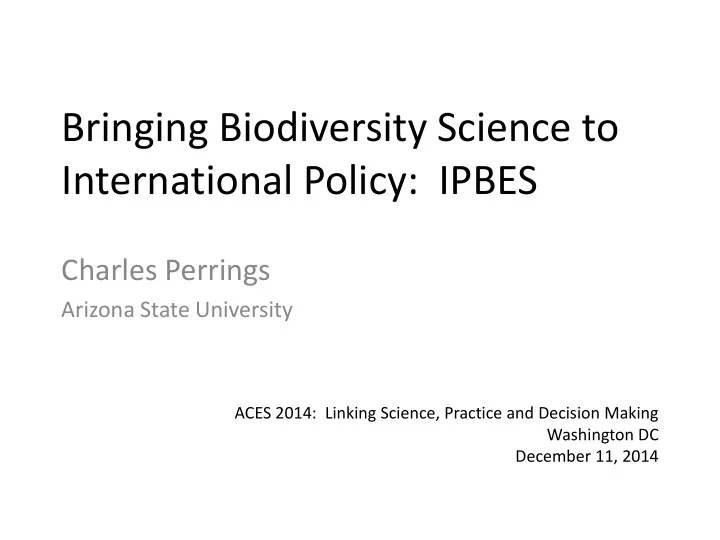

Bringing Biodiversity Science to International Policy: IPBES Charles Perrings Arizona State University ACES 2014: Linking Science, Practice and Decision Making Washington DC December 11, 2014
What is IPBES? • Overall objective: To provide policy relevant knowledge to inform decision making • Grew out of a French initiative in 2005 IPBES-1 (Jan 2013, Bonn) • Finally established in 2012 • 118 Members • Secretariat hosted in Bonn, Germany IPBES-2 (Dec 2013, Antalya)
The four functions of IPBES Policy makers, stakeholders Requests for information 3 Policy support to the Plenary Capacity 4 building 1 Assessments gaps knowledge generation 2 catalysis Scientific & funding communities
What does ‘policy support’ mean? • “ Policy support tools and methodologies are approaches and techniques, based on science and other knowledge systems, that can inform and assist the different phases of policy making and implementation at local, national and international levels. ” • Assessments should help evaluate feasible policy and management options
Which policy makers? At what scale? • National governments governments (Australia, Belarus, China, Mexico, New • Convention on Biological Zealand, Norway, France, Diversity Italy, Japan, UK) • T he six named ‘biodiversity - • 10 requests from 4 MEAs related conventions’* (CBD, CITES, CMS, UNCCD) • MEAs related to biodiversity and ecosystem services • 20 suggestions from others • United Nations agencies (e.g. BirdLife International, • Other stakeholders GBIF, ICSU, IUCN) * Convention Concerning the Protection of the World Cultural and Natural Heritage; Convention on • 22 requests from 10 International Trade in Endangered Species of Wild Fauna and Flora; Convention on Migratory Species; Convention on Wetlands of International Importance; the International Treaty on Plant Genetic Resources for Food and Agriculture; United Nations Convention to Combat Desertification
Work program objectives • Objective 1: Strengthen the capacity and knowledge foundations of the science-policy interface to implement key IPBES functions • Objective 2: Strengthen the science-policy interface on biodiversity and ecosystem services at and across the sub- regional, regional and global levels • Objective 3: Strengthen the knowledge-policy interface with regard to thematic and methodological issues • Objective 4: Communicate and evaluate IPBES activities, deliverables and findings
Questions to be discussed at IPBES 3 (January 2015) • How can ecosystems that provide ecosystem services be protected through investments, regulations and management regimes for terrestrial, freshwater, coastal and marine systems? • What are the effects of production, consumption and economic development on biodiversity, ecosystem services and their contribution to human wellbeing? • How can sectoral policies and new policy instruments make use of opportunities arising from the contribution of biodiversity and ecosystem services to human well-being?
How might IPBES differ from previous assessments? • IPBES offers an opportunity to inform policy in ways that differ from other assessments • plenary sets both the problem and the policy options to be evaluated by working groups • assessments report status and trends of biodiversity change in each problem area, along with the consequences for ecosystem services at multiple scales • ‘scenarios’ project consequences of specific policy options for addressing the problem at defined spatial and temporal scales Perrings, C., A. Duraiappah, A. Larigauderie, and H. Mooney. 2011. The Biodiversity and Ecosystem Services Science-Policy Interface. Science 331 :1139-1140.
The challenge for science • the information required to respond to the plenary spans both the natural and the social sciences • assessments should help governments, intergovernmental organizations, and multilateral environmental agreements evaluate the relative merits of specific strategies (mitigation, adaptation, and stabilization) • they should include quantitative projections of the consequences of specific strategies in biophysical and value terms
Acknowledgements, advertisements • Thanks to Anne Larigauderie, Executive Director of IPBES, for slide material • Options for IPBES considered in detail in: Perrings, C. (2014) Our Uncommon Heritage: Biodiversity, Ecosystem Services and Human Wellbeing . Cambridge University Press, Cambridge.
Recommend
More recommend